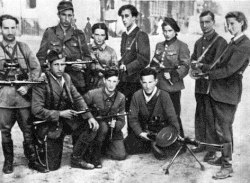Vitka Kempner

Vitka Kempner (Hebrew: ויטקה קובנר; 14 March 1920, Kalisz – 14 February 2012)[1] was a Polish Jewish partisan leader during World War II. She served in the Fareynikte Partizaner Organizatsye (FPO) and, alongside Rozka Korczak and founder Abba Kovner, assumed a leadership role in its successor group, the Nakam.
Early career
Kempner was 19 when the Germans invaded Poland, and she fled to Vilnius, Lithuania. When Lithuania fell to the Germans eight months later, Kempner and tens of thousands of other Jews were forced into a ghetto, where she met Korczak and Kovner. During World War II, their United Partisan Organization, or the FPO, was one of the most famous and successful Jewish partisan groups during the war, responsible for acts of sabotage against the Nazis. Kempner played an integral leading role in the organization, and is famous for blowing up a Nazi train line with a homemade bomb. She and her compatriots smuggled weapons through the city's sewer system, Kempner eventually becoming one of Kovner's closest lieutenants.[2][3]
The Avengers
After a failed ghetto revolt drove them out of Vilnius, the United Partisan Organization became the Avengers. This militia was based in Rūdnikai forest, and from there, they continued to sabotage Nazi operations. They destroyed Vilnius' power and water systems, operating in secret and looting peasant homes to stay alive. They lived in the forest for nine months, until Vilnius was occupied by Soviet forces, aided by the partisans.[2][3]
Post-war
After the war ended in 1945, Kempner and Kovner continued to fight against the Nazis. They helped evacuate hundreds of European Jews to British Palestine. Kovner also formed a new resistance group known as Nakam, or Revenge. Their goal was to take revenge on the Germans by poisoning the waterworks of important cities, but Kovner was arrested before they could put their plans to action. On April 13, 1946, Kempner and others infiltrated a bakery that supplied bread for Nazi POWs in Nuremberg. They coated 2,300 loaves of bread with arsenic before a guard was alerted and they were forced to flee. Many of the POWs fell ill, but none were reported dead.
Family life

Kempner and Kovner married in 1946.[4][5] In the same year, they moved to British Palestine, where they had two children. Kovner became a poet, and Kempner a clinical psychologist. They had forty years together before Kovner died in 1987. Kempner died in her home in Israel on 14 February 2012.
Kempner is remembered in the song Shtil, di nakht iz oysgeshternt by Hirsh Glick, which celebrates her heroic attack on a German convoy in the Vilnius sector in 1942.
References
- ^ "Barzel, Neima. "Vitka Kempner-Kovner." Jewish Women: A Comprehensive Historical Encyclopedia. 1 March 2009. Jewish Women's Archive". Retrieved 2016-10-10.
- ^ a b "Vitka Kempner: Avenger of the Holocaust". Rejected Princesses. Retrieved 2018-12-06.
- ^ a b "Vitka Kempner". Jewish Partisan Educational Foundation. 2017-04-19. Retrieved 2018-12-06.
- ^ Women and War: A Historical Encyclopedia from Antiquity to the Present - Bernard A. Cook - Google Books
- ^ The Avengers: Rich Cohen: 9780375705298: Amazon.com: Books
